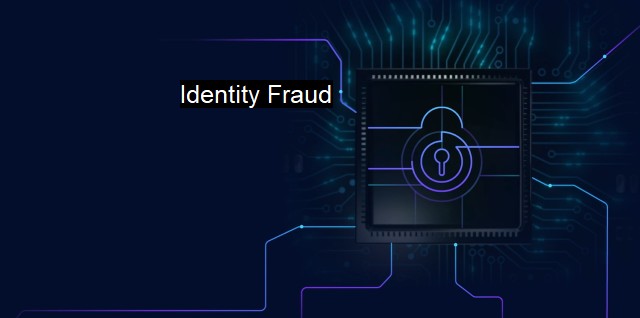What is Identity Fraud?
Combatting Identity Fraud: Understanding the Threat and Securing Personal Information from Cybercriminals
Identity fraud refers to any instance in which an individual uses another person's personal data in a way that involves fraud or deception, typically for economic gain—it’s often linked with identity theft, although the two are somewhat distinct. Understanding this concept becomes particularly significant in the expanding digital landscape, as innovative technological advancements also yield complex problems like cybercrime.Identity fraud has various means of accomplishment, yet the underlying foundation remains the same: an unscrupulous individual acquires unique personal information stored in fragile or insecure digital environments. The valuable data which cybercriminals target typically include social security numbers, banking details, credit card numbers, full names, as well as residential addresses. This pilfered information is then used illicitly to impersonate the victim, leading to financial frauds, false insurance claims, unauthorized credit card transactions, and even more severe criminal activities in the name of the victim.
The content of cybersecurity comes into play as the pivotal mechanism for defending against identity fraud. Cybersecurity practices aim to protect our increasingly digitized lives from malicious entities like hackers or cyber-criminals, who seek to exploit weaknesses in systems and networks to access valuable personal and corporate information.
Proactive measures such as internet security software, antivirus programs, firewalls and intrusion detection systems collectively constitute cybersecurity infrastructure. They safeguard users by providing real-time protection against malware, spyware, phishing scams, and other online threats that present possible entries for cybercriminals into networks or individuals' devices.
Antivirus software is an integral part of cybersecurity, as it is the first line of defense in guarding against, identifying, and eliminating the virulent software engineered to infiltrate and compromise a computing system. Antivirus programs detect threats through signature and heuristic based methods, flagging familiar threats and observing system behavior for abnormalities respectively—a testament to their significance in mitigating identity fraud.
Unfortunately, along with conventional types of identity fraud like credit card fraud or hijacking bank accounts, the increasing digitization and global networking provide criminals sophisticated platforms to carry out their activities with amplified anonymity and a wider reach. Emerging threats shave cyber-criminal activities such as the darknet markets where traded commodities often involve sensitive stolen identities that can amount to disastrous consequences for the victims.
We regularly hear the words 'data breach' – when a corporate giant's meticulous systems fail, blotting their reputations with shiny headlines exposing another leak of personal information. Many cybersecurity breaches lead to identity fraud, as these stolen data packets are often a treasure trove for eager criminals.
Educating oneself to recognize tell-tale signs of phishing attempts and scams goes a long way in curbing identity fraud. Implementing strong and unique passwords, two-factor authentications, refraining from disclosing sensitive information on unprompted requests, and regularly reviewing financial accounts for discrepancies are few simple practices that could make a considerable difference.
Keeping our software, systems, and antivirus programs up-to-date enables them to combat evolving threats effectively. Even nations around the globe deem information breaches severe enough to enact stringent data protection laws such as GDPR and CCPA, implementing hefty penalties against captured cyber-criminals to deter non-compliance.
Identity fraud poses severe financial risks to individuals and significant reputational risks to organizations. It remains an elusive enemy that preys on the innocent, exploiting their personal and confidential information for personal gain. Understanding identity fraud, being aware of it, and enforcing effective cybersecurity practices plays a crucial role in outlining effective security plans and prevention measures, making the digital environ safe for all stakeholders.

Identity Fraud FAQs
What is identity fraud?
Identity fraud is a type of cybercrime in which someone steals your personal information, such as your name, Social Security number, or credit card number, and uses it to commit fraud or other crimes.How can I protect myself against identity fraud?
There are several steps you can take to protect yourself against identity fraud, including using strong passwords, being careful about what personal information you share online, monitoring your bank and credit card accounts regularly, and using antivirus or security software on your devices.What should I do if I suspect identity fraud?
If you suspect identity fraud, you should immediately contact your bank or credit card company to report any fraudulent activity, place a fraud alert on your credit report, and file a report with the Federal Trade Commission. You should also change your passwords and monitor your financial accounts closely for any suspicious activity.What are the consequences of identity fraud?
Identity fraud can have serious consequences, including damage to your credit score, financial losses, and even legal troubles if the identity thief uses your personal information for criminal activity. It can also be a time-consuming and stressful process to recover your identity and restore your credit.| | A | | | B | | | C | | | D | | | E | | | F | | | G | | | H | | | I | | | J | | | K | | | L | | | M | |
| | N | | | O | | | P | | | Q | | | R | | | S | | | T | | | U | | | V | | | W | | | X | | | Y | | | Z | |
| | 1 | | | 2 | | | 3 | | | 4 | | | 7 | | | 8 | | |||||||